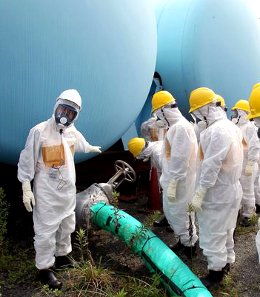Fukushima flows to ocean
 Japan has announced plans to release over a million tonnes of radioactive water into the ocean.
Japan has announced plans to release over a million tonnes of radioactive water into the ocean.
Tokyo Electric Power Company Holdings Inc (Tepco), owner of the destroyed Fukushima nuclear station, will begin pumping out treated water as part of a process that will take decades to complete.
Contaminated water has been building up ever since it was first used to bring three reactors under control following a 2011 earthquake and tsunami that knocked out electricity and cooling at the nuclear plant.
For almost ten years, Tepco has been using pumps and piping to inject water into the damaged reactor vessels to cool their melted uranium fuel rods.
The resulting contaminated water has been pumped out, treated and stored in huge tanks onsite.
Those tanks now hold about 1.3 million tonnes of radioactive water. It was not until 2018 that Tepco admitted it had not been filtering all dangerous materials out of the water.
Now, it says that it will filter the contaminated water again to remove isotopes, leaving only tritium.
Tepco will then dilute the water so that its tritium levels are below regulatory limits, and pump it directly into the ocean.
Nuclear plants around the world routinely release water containing tritium, which is considered to be relatively harmless at low levels because it does not emit enough energy to penetrate human skin. However, it can raise cancer risks when ingested.
The first water release from Fukushima will occur in about two years.
The buildup of contaminated water will continue until then, costing an estimated 100 billion yen (AU$1.19 billion) per year.
The water disposal is expected to take decades to complete, as it relies on a slow, rolling filtering and dilution process, alongside the planned decommissioning of the plant.
Fishing unions in Fukushima do not want the water released, as they say it will continue to damage the already tarnished reputation of local fisheries.
Tepco is engaging with fishing communities as well as paying for the promotion of agriculture, fishery and forest products to reduce any reputational harm to produce from the area.
Other nations have not welcomed the scheme either, with the South Korean municipal councils in Busan and Ulsan calling for the release plan to be scrapped.
A Chinese foreign ministry spokesperson last year called on Japan to act with a “high sense of responsibility towards its own people, neighbouring countries and the international community”.







 Print
Print